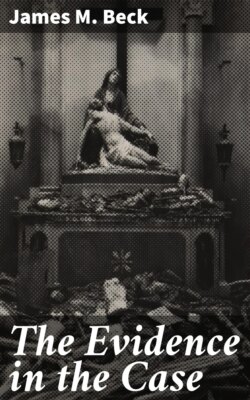Читать книгу The Evidence in the Case - James M. Beck - Страница 12
На сайте Литреса книга снята с продажи.
THE SUPPRESSED EVIDENCE
ОглавлениеTable of Contents
The official defenses of England, Russia, France, and Belgium do not apparently show any failure on the part of either to submit any essential diplomatic document in their possession. They have respectively made certain contentions as to the proposals that they made to maintain the peace of the world, and in every instance have supported these contentions by putting into evidence the letters and communications in which such proposals were expressed.
When the German White Paper is examined it discloses on its very face the suppression of documents of vital importance. The fact that communications passed between Berlin and Vienna, the text of which has never been disclosed, is not a matter of conjecture. Germany asserts as part of its defense that it faithfully exercised its mediatory influence on Austria, but not only is such influence not disclosed by any practical results, such as we would expect in view of her dominating relations with Austria, but the text of these vital communications is still kept in the secret archives of Berlin and Vienna. Germany has carefully selected a part of her diplomatic records for publication but withheld others. Austria has withheld all.
Thus in the official apology for Germany it is stated that, in spite of the refusal of Austria to accept the proposition of Sir Edward Grey to treat the Servian reply “as a basis for further conversations,”
we [Germany] continued our mediatory efforts to the utmost and advised Vienna to make any possible compromise consistent with the dignity of the Monarchy.[3]
This would be more convincing if the German Foreign Office had added the text of the advice which it thus gave Vienna.
A like significant omission will be found when the same official defense states that on July 29th the German Government advised Austria “to begin the conversations with Mr. Sazonof.” But here again the text is not found among the documents which the German Foreign Office has given to the world. The communications, which passed between that office and its ambassadors in St. Petersburg, Paris, and London, are given in extenso, but among the twenty-seven communications appended to the German White Paper it is most significant that not a single communication is given of the many which passed from the Foreign Office of Berlin to that of Vienna and only two which passed from the German Ambassador in Vienna to the German Chancellor. While the Kaiser has favored the world with his messages to the Czar and King George, he has wholly failed to give us any message that he sent in those critical days to the Austrian Emperor or the King of Italy. We shall have occasion to refer hereafter to the frequent failure to produce documents, the existence of which is admitted by the exhibits which Germany appended to its White Paper.
This cannot be an accident. The German Foreign Office has seen fit to throw the veil of secrecy over the text of its communications to Vienna, although professing to give the purport of a few of them. The purpose of this suppression is even more clearly indicated by the complete failure of Austria to submit any of its diplomatic records to the scrutiny of a candid world. Until Germany and Austria are willing to put the most important documents in their possession in evidence, they must not be surprised that the World, remembering Bismarck’s garbling of the Ems dispatch, which precipitated the Franco-Prussian War, will be incredulous as to the sincerity of their pacific protestations.
